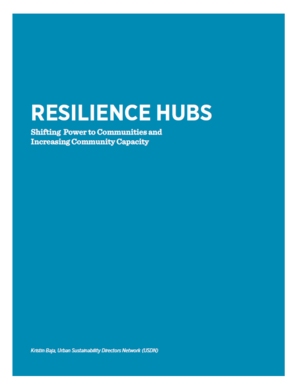You are here
Resilience Hubs White Paper - Shifting Power to Communities and Increasing Community Capacity
Primary tabs
 CLICK HERE - Resilience Hubs White Paper - Shifting Power to Communities and Increasing Community Capacity (10 page .PDF document)
CLICK HERE - Resilience Hubs White Paper - Shifting Power to Communities and Increasing Community Capacity (10 page .PDF document)
usdn.org
Summary
Resilience Hubs are community-serving facilities augmented to:
1. support residents and
2. coordinate resource distribution and services before, during, or after a natural hazard event.
They leverage established, trusted, and community-managed facilities that are used year-round as neighborhood centers for community-building activities. Designed well, Resilience Hubs can equitably enhance community resilience while reducing GHG emissions and improving local quality of life. They are a smart local investment with the potential to reduce burden on local emergency response teams, improve access to health improvement initiatives, foster greater community cohesion, and increase the effectiveness of community-centered institutions and programs.
(CLICK HERE - READ COMPLETE ARTICLE)



Comments
S FL Resilience Hub/Government MOU - Google Docs
A SFL Neighborhood Resilience Hub is led by a Community Chair, who serves as a liaison to the Community EOC (CEOC). During the preparedness phase, the Resilience Hubs provide preparedness resources and training to the community, listen to community concerns, and work to respond to comunity-identified needs that increase social cohesion and resilience. The Resilience Hub will become active when a hurricane watch is declared or notification of another type of emergency occurs. Appropriate hurricane (or other emergency) supplies and information will be distributed to the community. The Resilience Hub’s capacity and the community’s needs will determine he services offered.
CLICK HERE - See Google Document